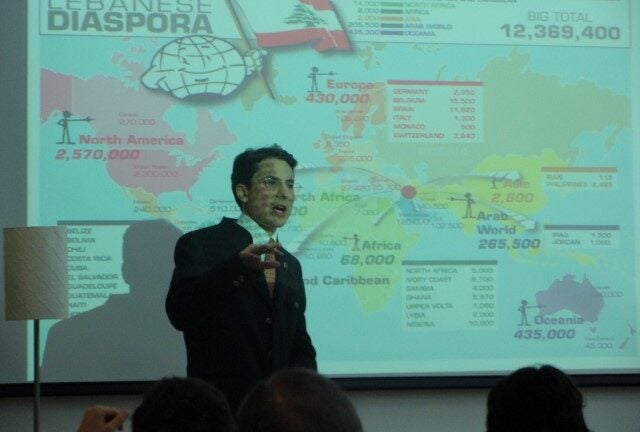Dialogue Series, Regional Studies
Mark Farha Lectures on Lebanon as the Mirror of Arab Politics

On April 7, 2009, Mark Farha, Visiting Assistant Professor at the Georgetown University School of Foreign Service in Qatar, was invited by CIRS to give the April Monthly Dialogue on the subject of “Lebanon as the Mirror of Arab Politics.”
Farha began by noting that the “sheer number of civil society organizations, the amount of political activism, and the dynamism of social activism that the city of Beirut has witnessed over the centuries is unparalleled.” He further emphasized Lebanon’s unique strength, which, he said, comes from the strategic geographical position that Lebanon occupies as a gateway to the Arab world and the Mediterranean Sea, helping to make it “one of the most vibrant terrains on earth” and “a meeting point for civilizations.” Farha explained that the “melting pot” effect created in Lebanon was as a result of the diversity of its cultures, religions and ethnicities that, for centuries, unleashed creative synergies through their interaction despite periodic backlashes of civil strife.
Historically, Lebanon was a cross-road for a variety of cultures that congregated in this particular location to partake in commercial and intellectual exchanges. One example from ancient history was that segments of the Justinian code were formulated in Beirut. Ancient Beyrutus was hailed as a center for law, and prospective jurists flocked to Lebanon from all over the world to study at its famous school of law until the 6th century.
“Lebanon,” Farha said, “is the oldest democracy in the Middle East, continuously operating since 1926,” and “despite all the trouble that one may associate with Lebanon, it should be borne in mind that what you have here is a political system, which, despite all its failings, has endured for very long periods.” Regarding the milestones of Lebanese political history, Farha pointed out that Lebanon has had no military coups d’état – in contradistinction to most Arab countries. The country has the highest density per capita of universities and secondary schools in the Arab world, which is partly a legacy of the establishment of Catholic and Protestant missionary schools, and, to this day, many “Lebanese are multi-lingual and quite well-educated.” Farha continued by recording that Lebanon was the first Arab country to grant women’s suffrage in 1953, which, he noted, occurred some twenty years prior to Switzerland’s granting of these rights.
“Lebanon has seen its share of confessional conflict throughout the ages” Farha recounted, but he argued that, due to Lebanon’s history and diverse mix of cultures, “the liberalism of Lebanon is a function of its pluralism. If you want to get along, if you have a country which is so divided, ethnically and religiously, there are a few options, and one of them is to find a modus vivendi, which de facto means recognizing each group and giving each its due…to maintain the peace long-term.” To this effect, Farha counted no less that eighteen officially recognized spiritual leaders in Lebanon, each representing a different confessional identity and each empowered by the constitution to voice their community’s concerns at the government level.
Despite all these various factions, Farha argued that Lebanon’s problems cannot all be blamed on the friction of confessional identities or external meddling. Juxtaposing the demographic make-up and class divisions of the country, Farha claimed that tensions will continue to loom if socio-economic disparities are not adequately tackled by an enfeebled state. As such, skewed forms of globalization and commercialism have shown a propensity to upset any balance that the country may have achieved.
Farha argued that each of the surrounding Arab countries experiences similar socio-economic and communal predicaments, but that their salience is accentuated by Lebanon’s unique diversity. Just as the hidden potential of Arab thought and culture can unfold in Lebanon’s open marketplace of ideas, so too the negative symptoms of the Arab world are writ large upon the face of Lebanese politics and society.
Farha concluded by outlining three possible future courses open to Lebanon: A pernicious emulation of the Israeli model of exclusive ethno-religious discrimination and confessional segregation; the confessional democracy Lebanon narrowly succeeded to preserve thanks to the 2008 Doha Accords mediated by Qatar; or, finally, the avenue leading towards true national integration in which each citizen is granted full and equal rights in all spheres irrespective of his or her personal religious identity. While Lebanon stands out as the only country in the region neither predicated on a religion of state nor a single sectarian hegemony, Farha underscored that the regional escalation of competing communalisms has rendered the reaffirmation of a trans-sectarian, inclusive Arab-Lebanese identity at once all the more difficult and indispensable.
Professor Mark Farha is currently teaching the core class “Comparative Political Systems” as well as an elective on “Globalization and Geopolitics of the Middle East.”
Article by Suzi Mirgani, CIRS Publications Coordinator.